News Story
CEPP’s Top 10 Accomplishments in 2023
Learn how CEPP worked this past year to enhance well-being for all.
What an exciting year 2023 was! We ramped up our support to the community supervision field; advanced data-driven, evidence-based, and trauma-informed policies and practices; and elevated the voices, expertise, and experiences of our justice-impacted consultants.
We can’t say this enough: we would not be able to do the vital work we do without our talented staff, generous funders and supporters, and system and community partners. Our collective dedication to reimagining a criminal justice system that works for all is what makes CEPP so respected.
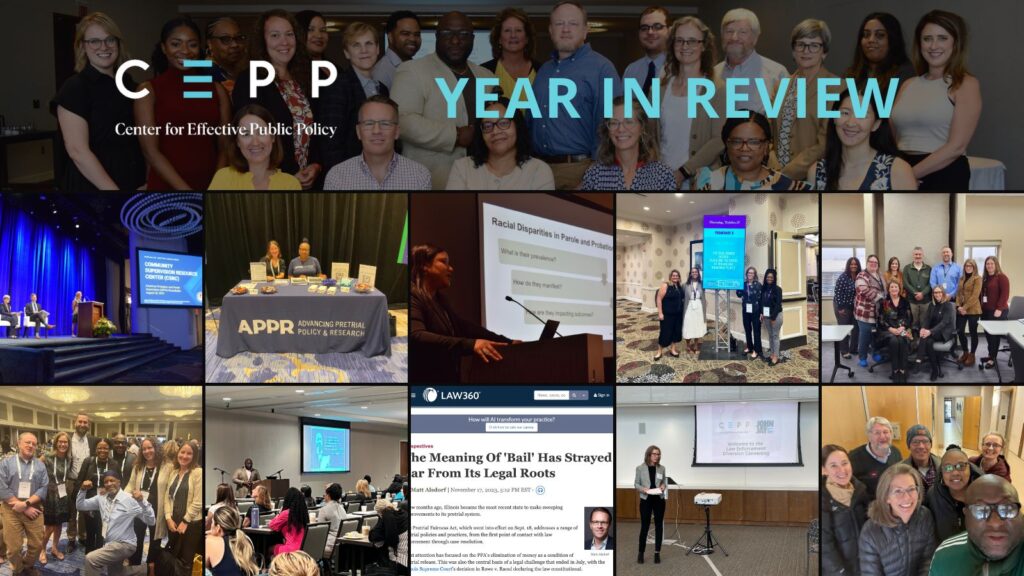
Explore CEPP’s top 10 accomplishments from 2023!
1. We began building the new resource center for the community supervision field.
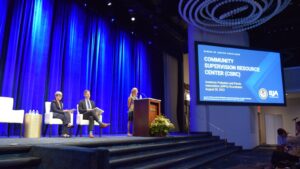 We have the distinct honor of managing the new Community Supervision Resource Center (CSRC), an initiative supported by the Bureau of Justice Assistance. When launched early this year, the CSRC website will be a source for information, training, and technical assistance for those responsible for pretrial, probation, and parole supervision. Through the dynamic website, people in the community supervision field can access new research, share their innovations, or learn about training and funding opportunities.
We have the distinct honor of managing the new Community Supervision Resource Center (CSRC), an initiative supported by the Bureau of Justice Assistance. When launched early this year, the CSRC website will be a source for information, training, and technical assistance for those responsible for pretrial, probation, and parole supervision. Through the dynamic website, people in the community supervision field can access new research, share their innovations, or learn about training and funding opportunities.
Sign up to receive announcements and updates about the CSRC.
2. We contributed to great strides in the fight for pretrial justice.
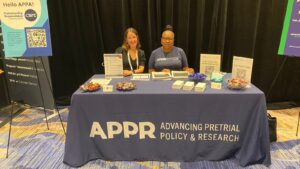 When the Pretrial Fairness Act (PFA) went into effect in Illinois in September 2023, the state made history by eliminating money bonds. Instead of the arbitrary practice of wealth-based detention, Illinois put in place sensible legal standards for intentional pretrial release and detention decisions based on the law and evidence. We worked with the Illinois Supreme Court Pretrial Implementation Task Force and are now collaborating with other organizations to assist government and community stakeholders with the sustained and successful implementation of the PFA. So far, the results are positive, and we hope Illinois will be a model for the nation.
When the Pretrial Fairness Act (PFA) went into effect in Illinois in September 2023, the state made history by eliminating money bonds. Instead of the arbitrary practice of wealth-based detention, Illinois put in place sensible legal standards for intentional pretrial release and detention decisions based on the law and evidence. We worked with the Illinois Supreme Court Pretrial Implementation Task Force and are now collaborating with other organizations to assist government and community stakeholders with the sustained and successful implementation of the PFA. So far, the results are positive, and we hope Illinois will be a model for the nation.
CEPP’s Advancing Pretrial Policy and Research (APPR) initiative continued to provide critical trainings and technical assistance to even more members of the pretrial field in 2023. APPR’s trainings covered several topics, including domestic violence/intimate partner violence support, community engagement, communications, and the Public Safety Assessment (PSA). APPR staff traveled around the country to provide in-person, tailored technical assistance, including to Oakland County, Michigan; Ramsey County, Minnesota; Montgomery County, Alabama; New Hanover County, North Carolina; and St. Croix County, Wisconsin, just to name a few.
3. We helped counties become more data-driven and, as a result, more aware of racial and ethnic disparities.
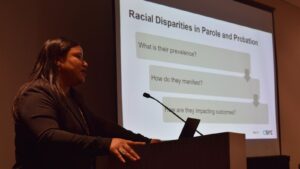 Evidence and data are key to understanding problems and creating effective solutions. We have continued to work with jurisdictions to build their capacity to gather and analyze relevant data and information to measure performance and, as a result, make meaningful improvements to their systems.
Evidence and data are key to understanding problems and creating effective solutions. We have continued to work with jurisdictions to build their capacity to gather and analyze relevant data and information to measure performance and, as a result, make meaningful improvements to their systems.
We started working with La Crosse County, WI, in 2022 to identify racial and ethnic disparities in their pretrial system and, in March 2023, presented a report with our findings to the county’s Criminal Justice Management Council. Since then, we’ve worked closely with the county to identify strategies that address racial disparities in the criminal legal system and communities most impacted. In early August, we met with pretrial justice stakeholders and supervision staff to better understand the local landscape and ideas, followed by a strategic planning session in early December with local criminal justice leaders to identify areas of focus for action.
Similarly, in Outagamie County, WI, we’ve facilitated meetings with the Equity in the Criminal Legal System (ECLS) Subcommittee and community stakeholders to determine the scope of racial and ethnic disparities in their criminal legal system. Through this process, we’ve analyzed arrest, jail, and pretrial data disaggregated by race to help them identify areas of concern and develop recommendations for the Criminal Justice Coordinating Council.
4. We broadened our portfolio of projects focused on gender equity.
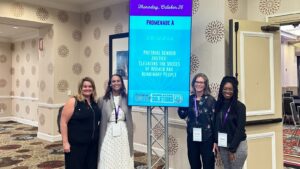 Our Building Pretrial Support for Justice-Involved Women work for Apple’s Racial Equity and Justice Initiative included a literature review, surveys, and listening sessions with pretrial services staff and justice-impacted women. We visited and interviewed staff from promising programs, and the result is a framework for working with justice-impacted women that we call “participatory pretrial.” Watch this space this year when we unveil our participatory pretrial model.
Our Building Pretrial Support for Justice-Involved Women work for Apple’s Racial Equity and Justice Initiative included a literature review, surveys, and listening sessions with pretrial services staff and justice-impacted women. We visited and interviewed staff from promising programs, and the result is a framework for working with justice-impacted women that we call “participatory pretrial.” Watch this space this year when we unveil our participatory pretrial model.
We also completed our work investigating the reintegration needs of BIPOC justice-involved women as part of Qualcomm’s Racial Justice Giving Initiative. We hope to share critical information early this year to help staff who work in facilities better support women in their journey from incarceration to their communities.
We partnered with FCI Tallahassee to design and implement a curriculum tailored to accelerate and improve the safety and well-being of its employees and population of women and nonbinary people. Employees went through a two-day training with CEPP that has helped them make significant headway in positively impacting the adults in their custody. We’ll continue working with FCI Tallahassee through this year.
In 2023, we applied the Gender-Informed Practice Assessment (GIPA) to expand the use of gender- and evidence-based practices in correctional facilities for women in Oregon. CEPP also worked closely with several agencies to implement the Gender-Responsive Policy and Practice Assessment-Community Version (GRPPA-CV) through training, coaching, and ongoing consultation. Each agency was able to look closely at existing policies and practices and their alignment with gender- and trauma-informed research.
5. Our evidence-based decision making work has grown and proven to be an effective model for collaborative problem solving.
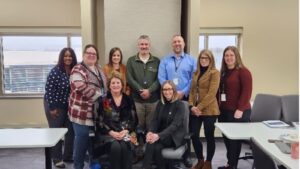 We are creating an online workspace and providing training and technical assistance for the Justice Reinvestment Advisory Council (JRAC) to support the Evidence-Based Decision Making (EBDM) Framework in Indiana’s 92 counties. The JRAC workspace outlines key principles, practical steps, examples, and helpful information that counties can use to assist them in moving forward with their work.
We are creating an online workspace and providing training and technical assistance for the Justice Reinvestment Advisory Council (JRAC) to support the Evidence-Based Decision Making (EBDM) Framework in Indiana’s 92 counties. The JRAC workspace outlines key principles, practical steps, examples, and helpful information that counties can use to assist them in moving forward with their work.
Over the last few years, we’ve been working with several counties in Minnesota to implement dosage probation, an innovative and research-informed approach to sentencing and supervision. The model has improved the alignment of probation departments with their stakeholders around evidence-based sentencing, treatment, and supervision decisions. It has offered a path to help jurisdictions allocate limited resources for supervision more efficiently while decreasing recidivism and maximizing public safety and community well-being. This work will continue this year, with the completion of the Dosage Probation Toolkit microsite to guide practitioners nationwide around the implementation of the core components of the dosage probation model.
6. We have strengthened our work with people with lived experience in the carceral system and started supporting a project aimed at helping them grow personally, professionally, and academically.
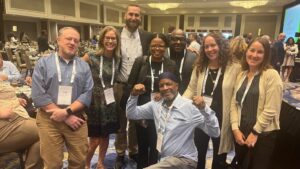 CEPP is honored to work with a stellar group of policy advisors with lived criminal justice system experience. Their expertise and unique perspectives help make our projects—and the policies and practices for which we advocate—more fair, just, and humane. We are very grateful to work and collaborate with these talented people on projects across all of CEPP’s major initiatives, including APPR, the CSRC, and the National Resource Center on Justice-Involved Women.
CEPP is honored to work with a stellar group of policy advisors with lived criminal justice system experience. Their expertise and unique perspectives help make our projects—and the policies and practices for which we advocate—more fair, just, and humane. We are very grateful to work and collaborate with these talented people on projects across all of CEPP’s major initiatives, including APPR, the CSRC, and the National Resource Center on Justice-Involved Women.
We are also pleased to be the new home for the Opportunity Scholars project, supported by the Mellon Foundation and in partnership with the Maine Department of Corrections. This initiative supports people currently and formerly incarcerated to grow personally, professionally, and academically through access to higher education and fulfilling careers. Our Opportunity Scholars will gain invaluable skills and experience for their career development, including serving as trainers, faculty, and staff and providing peer support to criminal justice system practitioners.
7. We’ve elevated our expertise and presented our projects to the field at multiple national convenings.
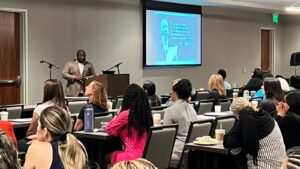 CEPP staff love attending and presenting at national conferences. It gives us the opportunity to showcase our expertise, connect with leaders in the field, and learn new ideas for how to make our system more fair, just, and effective.
CEPP staff love attending and presenting at national conferences. It gives us the opportunity to showcase our expertise, connect with leaders in the field, and learn new ideas for how to make our system more fair, just, and effective.
We presented at many conferences in 2023, including:
- Alabama Judges Winter Conference in Mobile, AL
- American Probation and Parole Association (APPA) Winter Regional Training Institutes in Columbus, Ohio; Philadelphia, PA; and New Orleans, LA
- Beyond the Bars Conference in New York, NY
- Association of Paroling Authorities International Conference in Kansas City, MO
- California Association of Pretrial Services Conference in San Diego, CA
- National Association for Court Management in Tampa, FL
- International Community Justice Association Conference in Cleveland, OH
- APPA Summer Training Institute in New York, NY
- National Association of Pretrial Services Agencies Annual Conference and Training Institute in New Orleans, LA
- Association for Justice-involved Females and Organizations Conference in Tulsa, OK
8. Our staff have been published in news outlets across the country, showcasing our and our partners’ impressive work.
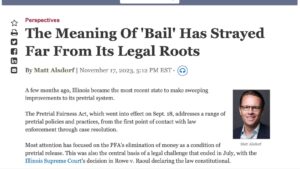 CEPP staff are experts in their fields, and we frequently author opinion pieces and letters to the editor and speak to journalists. This affords us the opportunity to share insights from our work that can help advance positive changes in the field and change public opinion on critical topics.
CEPP staff are experts in their fields, and we frequently author opinion pieces and letters to the editor and speak to journalists. This affords us the opportunity to share insights from our work that can help advance positive changes in the field and change public opinion on critical topics.
In 2023, our staff were published in Law360, CT Mirror, The Spokesman-Review, and five local Illinois newspapers: Illinois Business Journal, Rochelle News-Leader, The Daily Chronicle, The Pantograph, and The Quad-City Times.
9. We added important new resources to our growing library to support criminal justice professionals.
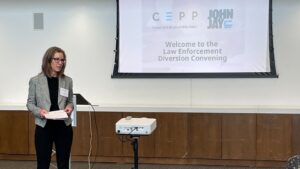 CEPP’s resources serve as practical guides and evidence-based investigations for the criminal justice field. In 2023, we published a total of 22 new resources and stories. This includes A Case Study on the HealthLink Diversion Tool, which looks at the operational challenges of implementing evidence-based tools in policing. CEPP convened a small group of criminal justice leaders to discuss and learn why implementation of new data-oriented tools and other diversion efforts are often not having their intended impact and to strategize about ways to ensure these initiatives are more effective in the future.
CEPP’s resources serve as practical guides and evidence-based investigations for the criminal justice field. In 2023, we published a total of 22 new resources and stories. This includes A Case Study on the HealthLink Diversion Tool, which looks at the operational challenges of implementing evidence-based tools in policing. CEPP convened a small group of criminal justice leaders to discuss and learn why implementation of new data-oriented tools and other diversion efforts are often not having their intended impact and to strategize about ways to ensure these initiatives are more effective in the future.
CEPP’s APPR initiative developed several educational infographics and reports for the pretrial field, including What Is a Pretrial Detention Hearing? and Counsel at First Appearance. APPR’s resources help criminal legal system professionals work toward fair, just, and equitable pretrial practices that positively impact people, systems, and communities.
10. We expanded our leadership team to include our new Associate Directors and reorganized how we want to guide and support our team in the future.
 We are fortunate to have on our team an extremely talented group of individuals with various backgrounds in the criminal justice field. We will continue to foster and develop that talent by recognizing our staff members who have shown exceptional leadership skills. In 2023, we were very pleased to promote Tanya Anderson and Dr. Kelvin L. Banks to Associate Directors. They join Associate Directors Matthew Alsdorf and Anke Mann and now form part of the CEPP leadership team. Their experience and insights will support our Board of Directors in making CEPP the best organization it can be.
We are fortunate to have on our team an extremely talented group of individuals with various backgrounds in the criminal justice field. We will continue to foster and develop that talent by recognizing our staff members who have shown exceptional leadership skills. In 2023, we were very pleased to promote Tanya Anderson and Dr. Kelvin L. Banks to Associate Directors. They join Associate Directors Matthew Alsdorf and Anke Mann and now form part of the CEPP leadership team. Their experience and insights will support our Board of Directors in making CEPP the best organization it can be.
Be sure to check back in with us this year as we continue working toward a world where all justice is community justice!
